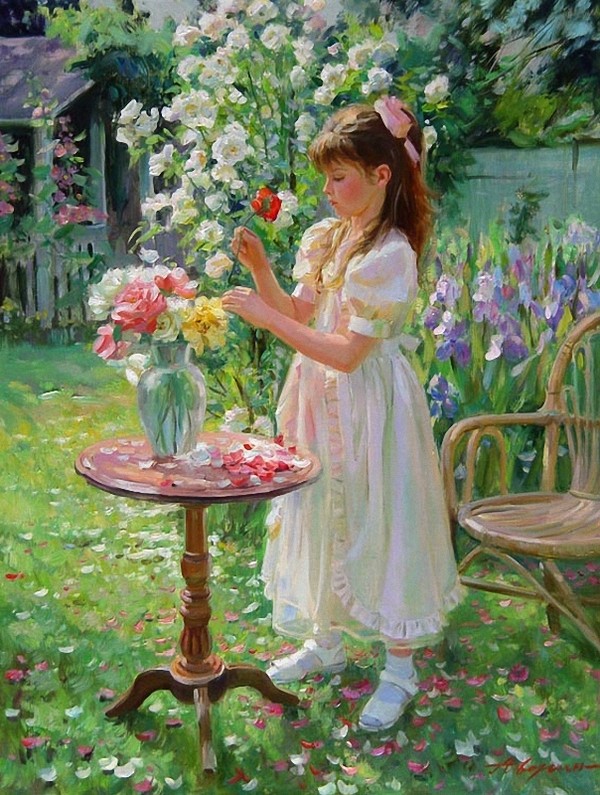
My last choice of a love poem from the beautiful collection Asylum Poems by John Clare. Soft and gentle, full of flowers and nature’s beauties, it smiles with words of love.
Where She Told Her Love
I SAW her crop a rose
Right early in the day,
And I went to kiss the place
Where she broke the rose away
And I saw the patten rings
Where she oer the stile had gone,
And I love all other things
Her bright eyes look upon.
If she looks upon the hedge or up the leafing tree,
The whitethorn or the brown oak are made dearer things to me.
I have a pleasant hill
Which I sit upon for hours,
Where she cropt some sprigs of thyme
And other little flowers;
And she muttered as she did it
As does beauty in a dream,
And I loved her when she hid it
On her breast, so like to cream,
Near the brown mole on her neck that to me a diamond shone
Then my eye was like to fire, and my heart was like to stone.
There is a small green place
Where cowslips early curled,
Which on Sabbath day I trace,
The dearest in the world.
A little oak spreads oer it,
And throws a shadow round,
A green sward close before it,
The greenest ever found:
There is not a woodland nigh nor is there a green grove,
Yet stood the fair maid nigh me and told me all her love.
Source of the poem: John Clare, Poems chiefly from manuscript, London: Richard Cobden-Sanderson (1920), digitised on Internet Archive. The poem is page 223. See also the hypertext transcription (with a slightly inexact indentation of the verses) as a Project Gutenberg ebook.
A slightly different version is given in Life and Remains of John Clare, The “Northamptonshire Peasant Poet” by John Clare, edited by J. L. Cherry, London: Frederick Warne & Co. (1873), digitised on Internet Archive. The poem is page 209. See also the hypertext transcription (without indentation of the verses) as a Project Gutenberg ebook.
Note: One often finds different versions of Clare’s poems, some having linguistic peculiarites. For instance, English poetry often replaces consonants by apostrophes, so “ever” and “over” become “e’er” and “o’er,” but in some versions they are simply “eer” and “oer.” In the Introduction of John Clare’s Poems: The Lifetime Published Poetry (the 2009 online edition of all four of Clare’s collections of poetry published in his lifetime), Simon Sanada explains:
The new OET edition of Clare’s poetry, while comprehensive, has been derived entirely from original manuscripts, and reproduces the idiosyncratic spelling, grammar and punctuation. The poems are therefore quite different in appearance from how they were first printed in the volumes published during Clare’s lifetime. Apart from a poorly edited version of his first volume Poems Descriptive of Rural Life and Scenery, published in 1986, and the recent parallel-text edition of The Shepherd’s Calendar by Tim Chilcott (2006), which includes only the title poem, the lifetime volumes have not been reprinted since their original publication in the 1820s and 1830s. The versions of Clare’s poems that appear in them have been entirely superseded by the revised versions from manuscript. So while it is easier than it has ever been for scholars and students of Clare to read his poems as he originally composed them, it remains difficult to obtain access to the poems as they were initially presented to Clare’s readers in the early nineteenth century.
On the other hand, in Poems Chiefly from Manuscript by John Clare, the introductory note by Edmund Blunden and Alan Porter states (page 5):
Punctuation and orthography have been attempted; Clare left such matters to his editor in his lifetime, conceiving them to be an “awkward squad.” […] So regularly does Clare use such forms as “oer,” “eer,” and the like that he seems to have regarded them not as abbreviations but as originals, and they are given without apostrophe.
This is a revised version of a post previously published on Agapeta, 2016/06/19.

